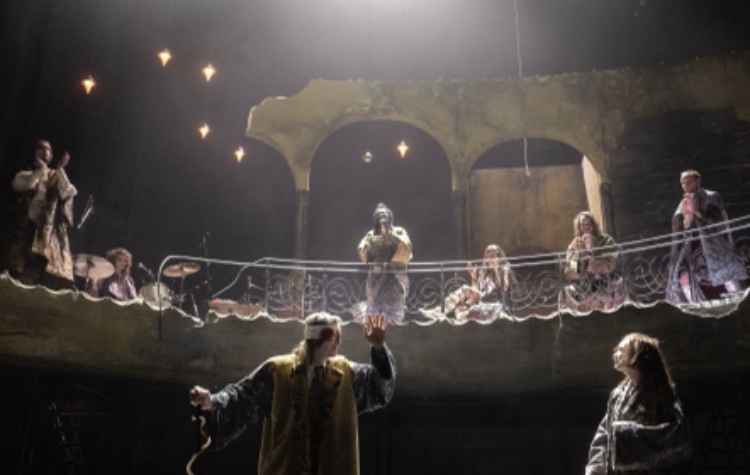We could have turned back.
The production of Eure Paläste sind leer (Your Palaces Are Empty) marks the first time a play by award-winning Austrian dramatist Thomas Köck premieres at a Munich theatre. The only dramatist to win the important Mühlheimer Dramatikpreis twice in a row, in 2018 and 2019, Köck focuses on choric theatre, his dramas resemble musical compositions and are written as continuous texts without punctuation. Eure Paläste sind leer (all we ever wanted) is his first collaboration with director Jan-Christoph Gockel, and the beginning of a long-term relationship with the Münchner Kammerspiele.

Thomas Köck’s plays, such as his climate trilogy, focuses on the collapse of civilization, the colonial debt of western countries, and the entanglement between the west and the global south. In Eure Paläste sind leer (Your Palaces Are Empty), Köck describes a horrifying dystopian future in three overlapping time periods. The performance is structured by the musical rhythm of Köck’s text and music mostly provided by the live band on stage, conducted by Anton Berman. The play is subtitled “missa in cantu” and Köck clearly uses the structure of spiritual choral songs, requiem and liturgy, as well as being influenced by Dante’s Divine Comedy.
Julia Kurzweg’s stage design consists of two levels, with the upper level resembling the beautiful art nouveau balcony of the Kammerspiele auditorium. The actors are watching the audience from a space that is as dilapidated as the palace,which the narrator describes in a very lyrical text. The abandoned palace is the starting point for Köck’s relentless exploration of the origins of global capitalism and the exploitation of the planet.
The actual performance begins as the mythological character Teiresias, the blind seer, enters. Although an essential character in Oedipus or T.S. Eliot’s The Waste Land, Teiresias always remains on the side-lines, watching the destruction unfold around him: A silent observer who knows what is going to happen, still he remains passive. Teiresias, played by different actors with blood-soaked blindfold, walks through the destroyed palace, the scenery of a lost civilization. Everybody has fled. The palace is abandoned.
The second strand takes us back to 1550. A group of greedy, power-hungry people – Spanish conquistadors and colonists –are on their way to South America on the search for El Dorado. Inspired by Werner Herzog’s film Aguirre, the Wrath of God (1972), Köck describes how Lope de Aguirre sailed to South America in the 16th century, under the flag of the Catholic Church, plundering and murdering his way through Brazil. In Gockel’s production, their boat is a VW Golf, and the conquerors are puppets, created by puppet-maker Michael Pietsch. Cameras are used to film the interior of the car as it slowly moves onto the stage. The jolly group is led by Don Miguel, a softie with a minuscule sense of justice, whose days are therefore numbered, Don Aguirre, his greediness and cruelty firmly carved into his face, and the representative of the Catholic Church, debauched Don Stepano, on a mission from God and the King to convert or torture the indigenous people of Brazil. The conquistadors aim to force their culture onto the “savages,” striving to create a monocultural world. Shouting “thus shall this landscape be subjected,” they drive into the jungle to tame evil nature, ahead of their foot-soldiers, who are miniature puppets, dangling from strings (all played by Nancy Mensah-Offei). When they finally arrive at El Dorado, a bright yellow E keels over to form the letter M.
The third strand is probably the weakest part of the play, revolving around the opioid crisis in 21st century America which was caused by greed of the pharma industry. Hundreds of thousands of Americans are now addicted to painkillers, many have died because of their addiction, including the parents of a puppet boy. He is the most touching and poetic character of the production, as he looks sadly at the devastation caused by former generations, who remained passive although they knew. Meanwhile, a former top earner (Bernardo Arias Porras) is cooped up in his house as TV reporters (Christian Löber and Leoni Schulz) are lying in wait. Far away, overworked, and underpaid workers get through their days in slaughterhouses by using opioids, dropping like flies, whilst others skate across the stage in bright red latex outfits around a gigantic yellow M.
Jan-Christoph Gockel shows Köck’s dystopian horror vision in his elaborate, playful production as a perverted continuous striving for profit. In the end, only ghosts remain in a desolate,ruined world.
A highly theatrical and playful production featuring an excellent cast, outstanding puppetry, and a superb live band. It should not be missed.
Review written by Carolin Kopplin.
Next performance of Eure Paläste sind leer (all we ever wanted) on Jan. 20th and 21st, 2022
For more info and tickets, click here…


Leave a Comment